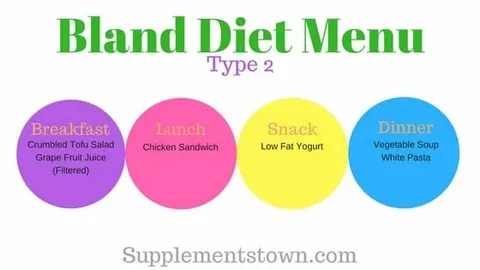The bland diet is a nutritive approach designed to help individualities manage digestive issues and promote recovery from certain medical conditions. While the term” mellow” may elicit images of tasteless foods, the mellow diet is actually a precisely structured authority that focuses on gentle, easy- to- condensation foods. This composition explores the principles of the mellow diet, its benefits, the foods included, and tips for following it effectively.
What is a Bland Diet?
Foods that are low in fat and fiber and free of tastes and other irritations that may irritate the stomach-related framework are included in the smooth eating regimen. It’s frequently recommended for individualities recovering from surgery, passing gastrointestinal discomfort, or dealing with conditions similar as gastritis, ulcers, or perverse bowel pattern( IBS). The main thing is to reduce vexation in the stomach and bowel, allowing them to heal while still furnishing essential nutrients.
Key Principles of the Bland Diet
- Easy to Digest: The eating routine spotlights on food sources that are delicate on the gastrointestinal system. These food varieties are more averse to conceive bulging, gas, or distress.
- Low in Fat: High- fat foods can complicate digestive issues, so the bland diet limits fat input, making it easier for the body to reuse.
- Minimal Fiber: While fiber is an essential part of a healthy diet, it can be prickly to the gut during certain medical conditions. The bland diet generally restricts high- fiber foods to reduce strain on the digestive system.
- No Spices or Seasonings: Strong flavors, spices, and acidic foods can irritate the stomach filling, so the bland diet avoids these factors.
Benefits of the Bland Diet
The bland diet offers several advantages, particularly for those with specific health concerns:
1. Supports Digestive Health
For individualities passing nausea, puking, or diarrhea, the bland diet can give relief. By minimizing prickly foods, the diet helps stabilize digestion and allows the gut to recover.
2. Eases Recovery After Surgery
Cases recovering from abdominal surgery may profit from a bland diet. It can help reduce discomfort and help complications related to digestion during the mending process.
3. Reduces Symptoms of Gastrointestinal Disorders
Conditions like gastritis, peptic ulcers, and IBS can beget significant digestive torture. Following a bland diet may palliate symptoms and promote mending by avoiding foods that spark pain or discomfort.
4. Easy to Follow
The bland diet is straightforward, making it easier for individualities to know which foods to eat and which to avoid. This simplicity can be especially helpful for those feeling bad or overwhelmed.
Foods to Include in a Bland Diet
When following a bland diet, it’s essential to choose foods that cleave to its principles. Then’s a list of foods generally included
Grains
- White rice: A staple in the dull eating routine, white rice is not difficult to process and can give energy.
- Plain pasta: Like rice, plain pasta is delicate on the stomach.
- Oatmeal: Cooked oats without added sugar or flavorings can be alleviating and nutritious.
Proteins
- Lean meats: Skinless chicken or turkey, prepared or bubbled, give protein without added fat.
- Fish: Gentle white fish, like cod or haddock, is an incredible choice when steamed or poached.
- Eggs: Mixed or bubbled eggs can be a decent wellspring of protein.
Fruits and Vegetables
- Bananas: Delicate, simple to prepare, and rich in potassium are bananas..
- Applesauce: Natural item purée without added sugar has several benefits and is easy on the stomach.
- Cooked carrots: Carrots that are steamed or foamed are nutrient-dense and simple to prepare.
Dairy Products
- Low-fat yogurt: with its most basic form, yogurt can aid with digestion and is a good source of probiotics.
- Cottage cheese: This delicate cheddar is light on the stomach and simple to eat.
Beverages
- Water: Remaining hydrated is urgent, particularly if encountering gastrointestinal issues.
- Herbal tea: Non-jazzed natural teas can give warmth and solace.
- Clear broth: A relieving choice that can assist with recharging lost liquids and supplements.
Foods to Avoid on a Bland Diet
Certain food sources ought to be kept away from while on a boring eating routine, as they can bother the stomach related framework:
- Spicy foods: Hot peppers, stew powder, and zesty sauces ought to be disposed of.
- Fried foods: Food varieties prepared in oil or fat can worsen stomach related issues.
- High-fiber foods: Entire grains, crude organic products, and certain vegetables (like broccoli and cauliflower) ought to be stayed away from during this time.
- Caffeinated beverages: Espresso, tea, and soft drink can aggravate the stomach lining.
- Alcohol: Liquor can be brutal on the stomach related framework and ought to be stayed away from.
Tips for Following a Bland Diet
- Start Slow: If you’re sick and need to change to a bland diet, start with clear liquids and add bland foods as you can.
- Portion Control: Eating more modest, more regular dinners can assist with forestalling overpowering the stomach related framework.
- Stay Hydrated: Drink a lot of liquids, yet keep away from those that might bother the stomach, as jazzed or sweet refreshments.
- Listen to Your Body: Focus on how your body answers various food varieties. In the case of something causes uneasiness, dispense with it from your eating routine.
- Consult a Healthcare Professional: Prior to beginning a tasteless eating routine, particularly for clinical reasons, talk with a medical services supplier or an enrolled dietitian to guarantee it meets your singular necessities.
Conclusion
The bland diet serves as a practical result for individualities passing digestive issues, those recovering from surgery, or anyone in need of a gentle nutritive approach. By fastening on fluently digestible foods and avoiding annoyances, individualities can support their digestive health and promote recovery. While it may feel restrictive, the mellow diet can be a temporary yet effective strategy to ameliorate overall well- being. Always consider consulting with a healthcare professional to knitter the diet to your specific health requirements.

